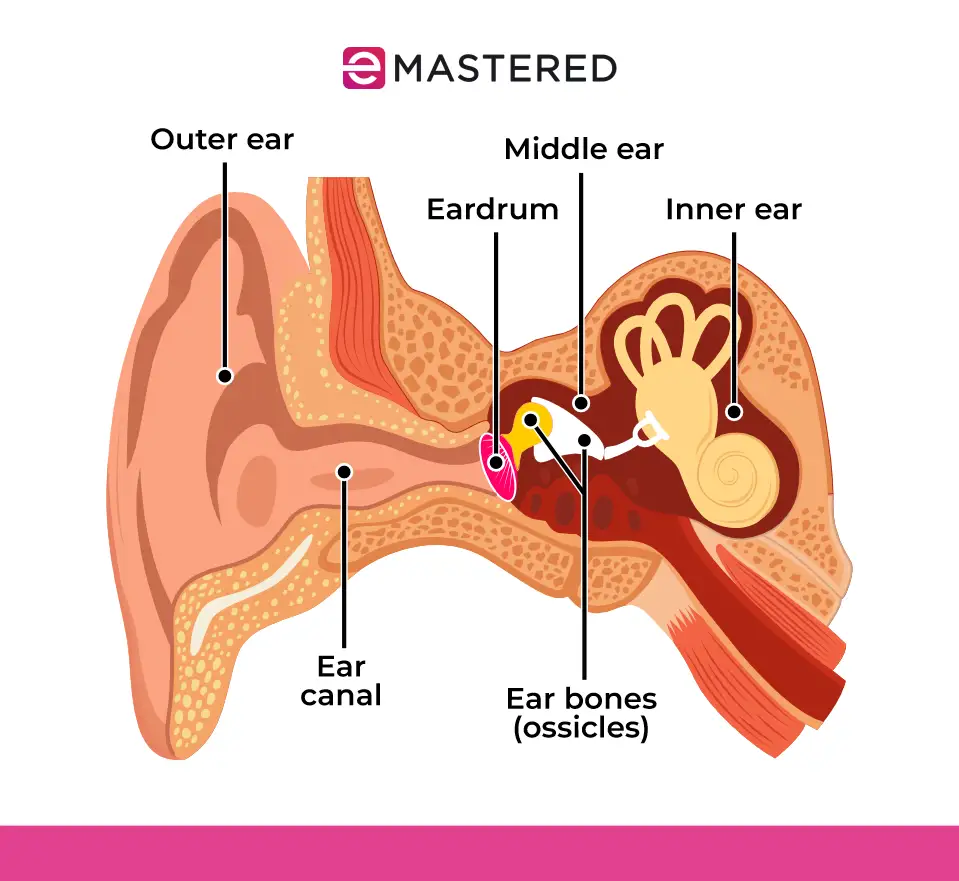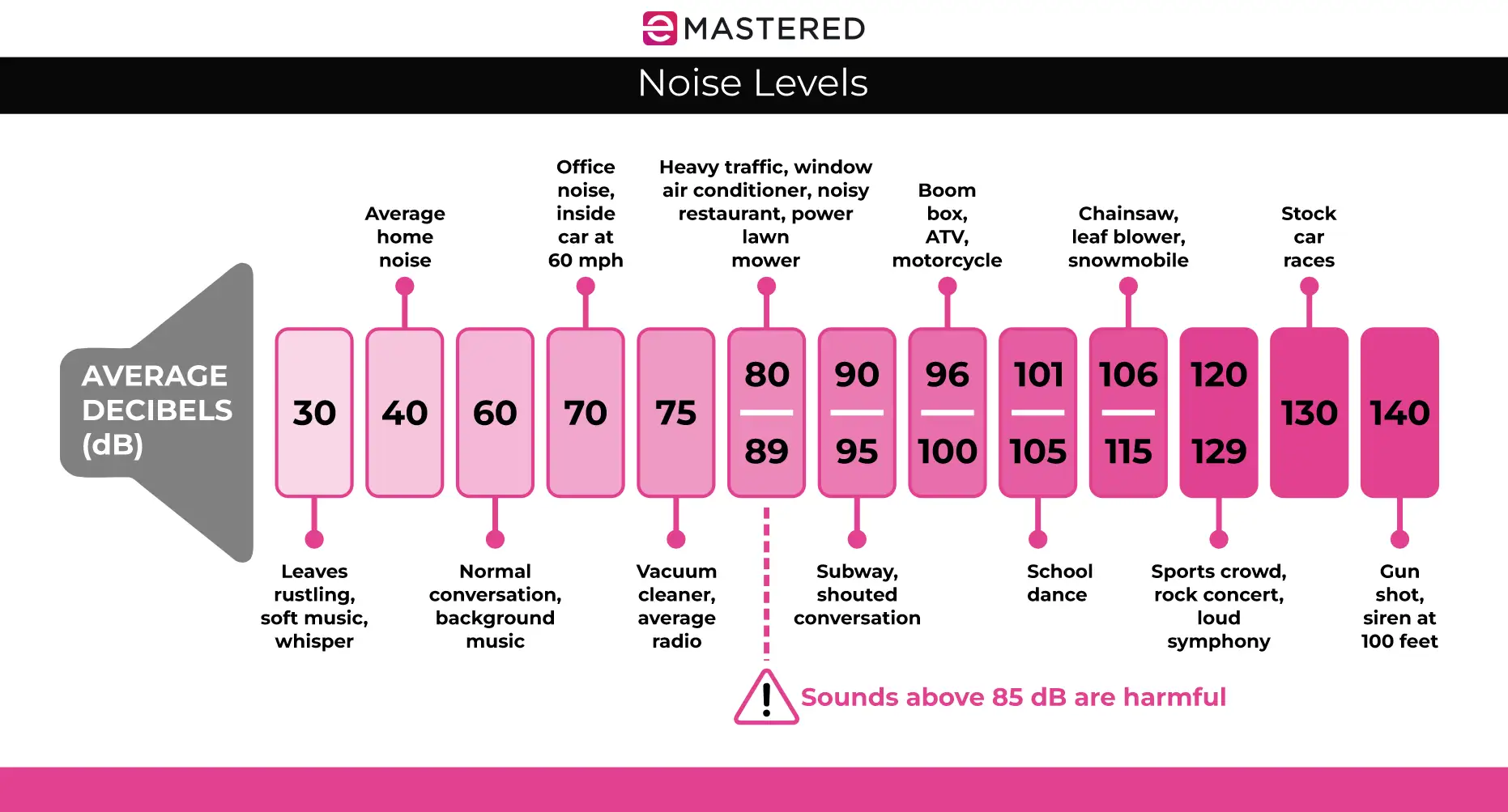Question: what do Chris Martin, Brian Johnson, Phil Collins, and Steve Lukather all have in common?
Answer: they’ve all suffered from some form of hearing loss.
And when you’re a musician, that’s pretty catastrophic.
According to a 2014 study by the British Medical Journal musicians are four times more likely to suffer from noise-induced hearing loss as a ‘normal’ person. We musos are also 57% more likely to develop tinnitus - that unpleasant, incessant ringing in your ears that isn’t your mother-in-law - as a result of our chosen career.
The good news is that this type of hearing loss is entirely preventable. Even more good news is that we’ve compiled this comprehensive guide on how to protect your hearing, to save you trawling the interwebs.
Find a quiet spot, get comfy, and read on to learn how to look after your hearing health.
How Our Ears Work
The human body as a whole is a well-designed piece of gear, and the ears are no exception. They transform subtle changes in air pressure into electrical signals, which our brains then interpret as sounds, speech, and music. Here's how the magic happens.
Sound waves travel through the air to the outer ear and move through the ear canal to vibrate the eardrum. Three teeny-tiny bones in the middle ear amplify the vibrations and pass them on to the cochlea in the inner ear. The cochlea is filled with fluid, and microscopic hair cells all tuned to a specific frequency range. The vibrations cause motion among the hair cells which is converted into electrical signals and passed along to the brain.
Pretty amazing stuff. More to the point, pretty darn complicated, and hence why it's super-important to protect your hearing.

Types of Hearing Damage
Given how complicated our hearing system is, it's a wonder it doesn't require the type of constant maintenance required of a Waves plugin. Evolution is indeed a beautiful thing.
But our hearing can suffer from issues nonetheless. Broadly speaking, you can split these into two types:
Short Term
Short term hearing issues can result from an obstruction in the ear canal - for example, from a build up of wax, or water retention.
The middle ear can also get infected, resulting in a build up of fluids. The same thing happens if you're prone to allergies. The fluid build-up affects the signals reaching your cochlea, and can in turn really mess with your hearing.
All these of course can be treated, and will in time go away without causing any permanent damage.
Long Term
Long term hearing problems are trickier to handle. These can be triggered by a number of things, including other health issues (including diabetes, stroke, or tumors), damage to the eardrum from infection or trauma, and even some medications. And of course, age-related hearing loss which begins around age 50.
However, as musicians we need to be concerned about one specific cause of long term hearing loss; damage to the inner ear hair cells as a result of prolonged exposure to excessive sound levels.
In other words, noise induced hearing loss.
What's Considered a Safe Sound Level?
There's a bunch of factors that can affect noise induced hearing loss, including volume, duration, genetics, and age. But it may surprise you to learn that hearing damage can begin at a mere 85dB.
For comparison, rustling leaves do there thing at around 30dB, a normal conversation is held at around 60dB, and an ambulance siren can nee-naw at 125dB.
Being awesome, Mother Nature has a equipped our ears with a self defense mechanism that protects our hearing. When exposed to any sound our ears temporarily reduce their sensitivity to sound to protect hearing. This is what causes ear fatigue .
But it's only temporary, and if the hair cells in your inner ear suffer repeated and ongoing high noise exposure they'll get damaged, leading to hearing loss. And there's no fixing it.

6 Tips for Preventing Hearing Damage
Professional musicians depend on their hearing to earn a living. But even those who play music for fun need to look after their lugholes if they want to maintain their full range of hearing.
So whether you pay the rent with your musical instrument, or you're just an average person who likes the odd loud concert, here's some tips to keep your ears in good nick and avoid having to wear hearing aids later in life.
Tip 1: Take Frequent Breaks
This is important if you spend a lot of time working in a home studio, and especially so if you wear headphones while you work .
Giving your ears a rest will prevent ear fatigue. This decrease in hearing sensitivity can lead you to constantly reach for the volume knob to turn things up, which in turn will damage your hearing.
Taking regular breaks will help avoid becoming desensitized to your listening environment, and protect against hearing loss.
Tip 2: Keep Monitor Levels Down
Paying attention to the level of your monitors or headphones will also help protect your hearing. Remember, listening to anything above 85dB comes with a high risk of permanent damage to your hearing, so keep things at a sensible level.
Tip 3: Use Earplugs
This may seem like a no-brainer, but it's shocking the number of musicians I've seen not wear ear protection at live shows. The reason for this could well be because not all earplugs are made equal.
Foam Earplugs
The squishy foam earplugs readily available at your local pharmacy, are probably the first thing that springs to mind when you think of hearing protection. While they do offer a buffer between your sensitive ear drums and a loud sound, they're not ideal for musicians.
That's because these kinds of earplugs typically reduce high frequencies, resulting in poor sound quality. Not great if you're trying to hear your own instrument, or your bandmates.
Musicians Earplugs
This is the kind of hearing protection musicians should be using, whether performing on stage, or attending a concert.
Earplugs made for professional musicians reduce the volume across the entire frequency range, resulting in a complete representation of the soundscape but at a lower volume. They allow you to hear the details of a musical performance but not run the risk of needing a hearing aid later in life.
Universal fit musicians earplugs are not as expensive as you might think - you can grab a pair for under 50 bucks from Westone . A small price to pay for your hearing health.
Custom Musicians Earplugs
Many musicians decide that hearing protection is worth splashing out on, and invest in a set of custom earplugs. These are perfectly molded to your ear, ensuring a tight seal against loud sounds, yet still allowing you to hear everything with clarity.
In Ear Monitors
Nowadays, more and more professional musicians are using in ear monitors ( IEMs ) on stage and in the studio. These also offer some form of ear protection, provided you follow Tip #2 and keep the volume at a sensible level.
As with musicians earplugs, the better the fit the better protection they offer. Custom made in ear monitors will give you more isolation from the sound of the outside world.
Some in ear monitors have special filters that allow you to attenuate how much isolation they offer.
Tip 4: Protect at all times!
So far we've talked about the importance of wearing protection when playing music live. But there are many situations outside of the music world where your exposure to high decibel levels may result in hearing loss.
Mowing the lawn? Wear ear protection. Using power tools? Thing about your lugholes. Anytime there's loud noise, wear hearing protection.
Tip 5: Be Aware of Your Environment
If you're heading out to a Nickelback concert (why on earth would you?) you know things are going to be played loud.
But out on the street, do you know what the volume level is and how it may be affecting your hearing?
Use a smartphone app to keep an eye on noise levels around you and make smart choices about whether it's time to plug up.
Tip 6: Use Best Practices
When you use any form of in-ear protection, it's important to use it properly. Make sure the seal is snug; otherwise you're letting in noise, defeating the purpose of the plugs in the first place.
And don't be tempted to take one headphone out and leave one in; you'll only develop tinnitus in the exposed ear. If you're using in-ears and find you need to hear more of the stage noise around you, either add an ambient mic feed into your mix, or invest in a pair of headphones that have a filter that allows external sounds in without compromising the fit.
Signs You're Suffering From Hearing Loss
Tinnitus
If you play in a rock band, you'll probably have woken up the morning after a particularly loud gig with a high-pitched ringing in your ears. It's called tinnitus, and it's the sound of fatigued and dying hair cells letting you know there's been some kind of permanent damage to your hearing.
It's not just rock musicians who can suffer from tinnitus. Any musician, or member of the general public exposed to high decibel levels for a prolonged period of time will experience tinnitus.
Discomfort
Noise induced hearing loss as a result of repeated exposure to loud music can also result in discomfort when listening to music or speech above a certain level.
Worse, you may develop a hyper-sensitivity to certain sounds or a frequency range that the general population don't find too loud, such as a doorbell or a notification sound.
Playing out of tune
If your bandmates are scolding you for being too sharp when playing, it may be a sign that your hearing is on the blink.
General fatigue
Hearing loss doesn't just mean you can't hear the cymbals sizzle. Not being able to hear speech clearly can bring on fatigue from having to concentrate so hard. Other side effects of this include social isolation, or trouble concentrating.
No symptoms
Sometimes you might not have any of the above symptoms but still have suffered a loss of hearing at a certain frequency range. The only way you can be certain is to have a hearing test.
Hearing Health for Musicians
Your ears are the single most valuable piece of gear that you own. No matter how much fun you're having getting blasted with a wall of sound at a concert, living with tinnitus is no joke.
Any kind of hearing loss can be detrimental for a musician, and experiencing the world through hearing aids is always going to be second rate to the real thing.
So look after what you were born with. Protect yo'self, and go forth and maketh the music.





